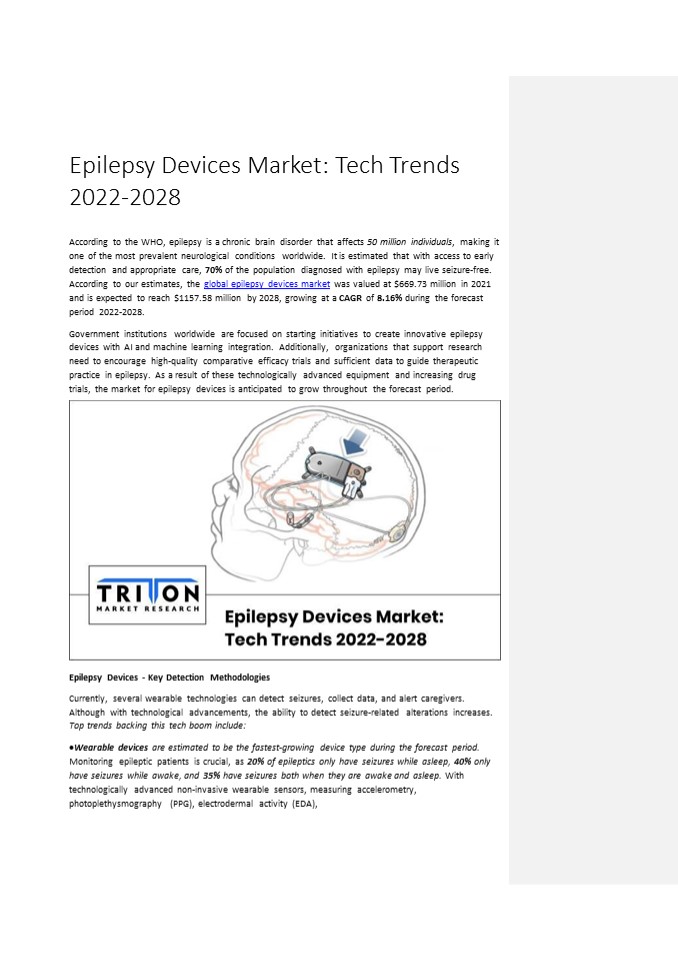Epilepsy Devices Market: Tech Trends 2022-2028 PowerPoint PPT Presentation
Title: Epilepsy Devices Market: Tech Trends 2022-2028
1
Epilepsy Devices Market Tech Trends
2022-2028 According to the WHO, epilepsy is a
chronic brain disorder that affects 50 million
individuals, making it one of the most prevalent
neurological conditions worldwide. It is
estimated that with access to early detection and
appropriate care, 70 of the population diagnosed
with epilepsy may live seizure-free. According to
our estimates, the global epilepsy devices market
was valued at 669.73 million in 2021 and is
expected to reach 1157.58 million by 2028,
growing at a CAGR of 8.16 during the forecast
period 2022-2028. Government institutions
worldwide are focused on starting initiatives to
create innovative epilepsy devices with AI and
machine learning integration. Additionally,
organizations that support research need to
encourage high-quality comparative efficacy
trials and sufficient data to guide therapeutic
practice in epilepsy. As a result of these
technologically advanced equipment and increasing
drug trials, the market for epilepsy devices is
anticipated to grow throughout the forecast
period.
- Epilepsy Devices - Key Detection Methodologies
- Currently, several wearable technologies can
detect seizures, collect data, and alert
caregivers. Although with technological
advancements, the ability to detect
seizure-related alterations increases. Top trends
backing this tech boom include - Wearable devices are estimated to be the
fastest-growing device type during the forecast
period. Monitoring epileptic patients is crucial,
as 20 of epileptics only have seizures while
asleep, 40 only have seizures while awake, and
35 have seizures both when they are awake and
asleep. With technologically advanced
non-invasive wearable sensors, measuring
accelerometry, photoplethysmography (PPG),
electrodermal activity (EDA),
2
- electromyography (EMG), and other signals outside
of the conventional clinical environment have
become effective. - Vagus Nerve Stimulation (VNS) has emerged as the
fastest-growing application category. VNS Therapy
has been approved by the U.S. Food and Drug
Administration (FDA) as an add- on therapy for
age 4 years and above to treat drug-resistant
epilepsy or refractory epilepsy. VNS has been
reportedly beneficial in many patients, including
the ones with posttraumatic epilepsy (PTE). PTE
is a common consequence of traumatic brain injury
and accounts for about 20 of symptomatic
epilepsy cases. - As per estimates, Electroencephalography lead the
detection and prediction devices type segment in
2021 and is expected to maintain its stronghold
during the forecast period. There is growing
interest in wearable or mobile EEG solutions that
allow long-term EEG monitoring in an easy-to-use
format. Despite the availability of these new EEG
solutions, their adoption is still limited in
clinical practice, mainly because of the
unfamiliarity of healthcare and biomedical
research sectors with the technology and its
application. - Strategic Initiatives and Government Approvals
- Different end-users, such as homecare settings,
hospitals, and clinics, are utilizing epilepsy
devices. The manufacturers of epilepsy monitoring
devices are likely to gain prominent business
opportunities from the hospital clinics segment
owing to the rise in the use of EEG monitoring
and emergency medical services. - The government authorities of several developing
nations, including India and China, are focusing
on developing sturdy healthcare infrastructure.
As a result, operating players are expected to
gain sizable growth prospects in the region
during the forecast period. Owing to this, the
Asia
Pacific epilepsy devices market is anticipated to
witness the fastest growth with a CAGR of 8.38
Kommentar A1 Hyperlink this Frame with revenue
statement
throughout the forecast period.
- In addition, companies are also focusing on
launching novel devices for children. Moreover,
companies are also using organic and inorganic
strategies, including mergers and acquisitions,
to stay ahead of the competition. Some of these
include - In September 2022, Boston Scientific
Corporations current-generation WATCHMAN FLX
Left Atrial Appendage Closure (LAAC) Device
received U.S. Food and Drug Administration (FDA)
approval to expand the instructions for use
labeling. The company also received FDA 510(k)
clearance for the EMBOLD Fibered Detachable Coil,
which reduces the blood flow rate in the
peripheral vasculature. - In July 2022, Medtronic PLC received FDA 510(k)
clearance for its UNiD Spine Analyzer v4.0
planning platform to leverage machine learning. - In November 2021, NeuroPace, Inc. received an
Investigational Device Exemption (IDE) from the
FDA to study the companys RNS System to treat
primary generalized epilepsy in patients aged 12
and above. - Way Forward
- With technological advancements, epilepsy
detection devices with exceptionally low false
alarm rates have recently been developed. They
are based on computationally intensive algorithms
and employed in implanted systems for
pre-surgical monitoring. Recent research has
produced encouraging findings for probabilistic
seizure risk projections using long-term wearable
technology
3
and electronic seizure diaries. The symptoms,
mood, and cognitive function of an individual may
also have predictive significance. Therefore,
technological advances in non-invasive wearable
sensors are anticipated to create growth
opportunities for the epilepsy devices
market. FAQ Q1) What are the key end-users of
the epilepsy devices market? The key end-users in
the epilepsy devices market include hospitals
clinics, neurology centers, homecare settings,
and other end-users. Q2) Which region leads the
global epilepsy devices market? North America
leads the global epilepsy devices market.

